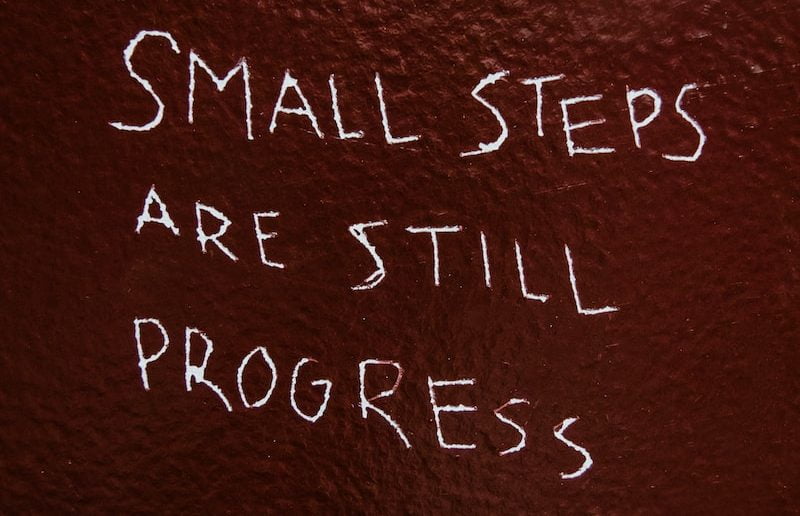Ever feel like you're stuck in a rut? Don't fret! It's time you unlock your full potential.
With these 9 steps, you'll be on your way to elevating your personal skills and talents for self development, enhancing mental fitness, advancing your career, and improving your ability. (Que up House of Pain – Jump) On your personal development journey, you'll learn new skills to identify strengths, embrace challenges with the ability to turn setbacks into comebacks, all while guided by a personal growth mentor.
Embarking on your personal development journey isn't just about enhancing personal development skills or acquiring new skills; it's about achieving mental fitness to become the best version of yourself.
Ready to step up your game?
Yeah… That's what I thought.
Why Personal Development Skills Are Important
Enhance self-awareness and identity
Foster talents and potential
Improve quality of life and contribute to the realization of dreams and aspirations
Increase employability and career advancement opportunities
Boost mental health and emotional well-being
Strengthen interpersonal relationships and social skills
Encourage a lifelong learning mindset
Develop resilience and the ability to cope with change
Promote better decision-making and problem-solving skills
Build confidence and self-esteem
Identify Your Core Strengths
To kick off your journey towards personal development skills, you've got to zero in on your core strengths first and identify new skills to include in your personal development plan. Set clear goals to ensure you stay on the path of self-improvement. A strengths inventory is an ideal tool for this.
It's not just about identifying personal development skills where you're good at, it's also about uncovering new skills and areas where you excel naturally in your personal development journey, potentially enhancing your job prospects. Your Zen place at work, the job's moments where life's joy meets focus, and people love engaging in their tasks.
Once you've compiled your personal development skills inventory, it's time for the next crucial step – applying your strengths in the work environment to seize every opportunity and enhance your job prospects. This means leveraging your personal development skills and strengths in practical, day-to-day situations at work to achieve job success. It's about turning your potential into performance. Lets Go!
Develop a Growth Mindset
With your strengths inventory in hand, it's important you foster a growth mindset, a vital ingredient in the development process of your career. This approach will enhance your job performance, contribute to your success, and help you excel in your work by elevating your personal skills and talents.
This means shifting your work mindset from a fixed perspective to one that embraces learning and development of skills, ensuring you're always ready to tackle any job-related question. Embracing this mindset shift will enhance your personal development skills, unlocking doors to new job opportunities and compelling you to step out of your work comfort zone, setting the stage for success and evolution.
Picture your success, visualize it. Success visualization is a powerful tool to keep you motivated and focused on your goals, enhancing your personal development skills, and can help you excel in your work or job aspirations.
Remember, as you start your job, the path to work success isn't a straight line; it's brimming with challenges and setbacks that test your personal development skills. With a growth mindset, view these challenges as opportunities for enhancing personal development skills, learning, and improvement, which can lead to success in your job and work environment rather than seeing them as obstacles.
Keep pushing, keep learning, keep growing. You're capable of more than you think!
Investing in Continuous Learning
After developing personal development skills and a growth mindset, it's crucial for you to invest in continuous learning to excel at work and tackle any job-related question. Continuous learning is the fuel that keeps the engine of your career development skills running smoothly, ensuring job success and providing the answer to any professional question.
Start exploring online courses in your field of interest for personal development; they're a treasure trove of knowledge and skills waiting to be unlocked, which can be pivotal in securing your next job.
Don't hesitate to question the content to solidify your understanding, and remember to keep your ID handy for course registrations. Don't let the fear of the unknown hold you back from asking the right question, achieving success, or taking that job start. Remember, every expert was once a beginner.
Professional development strategies, too, play a pivotal role. Attend personal development webinars, participate in industry conferences to enhance job-related skills, and network with professionals in your field for career success.
These strategies not only broaden your skills and knowledge base but also provide insights into the latest trends and best practices in personal development and data, enhancing your job prospects.
Embrace Challenges and Failures
Don't fear failure in your job; embrace it, as every mistake you make is an excellent teacher for personal development and success, honing your skills.
Overcoming fear of failure bolsters your courage, enhancing personal development and job success while equipping you with skills to grow through challenges.
Learning From Mistakes
By embracing challenges and learning from your mistakes, you're setting yourself up for unprecedented personal growth, skill enhancement, and career success. This development is essential in any job, and asking the right question can lead to significant progress.
Accepting mistakes in your personal development journey isn't a sign of weakness, but a clear indication of resilience and strength, crucial for job success. Always question, learn, and grow.
Acknowledging that you're human and prone to err is a crucial step in personal development, essential for success in any job, and the right question to ask oneself. But then, you don't just stop there.
Implement error analysis to dissect what went wrong in your personal development journey, understand how you can prevent similar mistakes moving forward, and ensure success by referencing past errors and incorporating comments for continuous improvement.
This isn't just about dwelling on failures; it's about extracting lessons and turning them into stepping stones for personal development and success. To start this journey, read the comments below for more insights.
Start your journey of personal development by using every mistake as an opportunity to grow, to become better, and to elevate your skills towards success. Always question how you can improve from these experiences.
Overcoming Fear of Failure
In your journey to personal development and success, another vital step to start is overcoming the fear of failure, using it as a reference for growth. This personal development journey involves embracing challenges and even failures as integral parts of the learning process, a reference point from which to start building success.
Fear can stifle your growth and strangle your potential. So, let's flip the script! See failure as a teacher, not a tormentor. Remember, embracing failure is a crucial start on the path to success, serving as a reference for personal development, not a resignation to defeat.
Start your journey towards personal development and success by taking calculated risks and applying risk mitigation strategies to lessen potential fallout, using them as a reference for growth. Yet, don't be afraid to stumble.
Each failure brings you one step closer to success. Embrace your failures in personal development, learn from them to achieve success, and grow stronger from them as you start building your id.
This is your journey, and your life. Don't fear failure. Rise above it, learn from it, and with personal development, you'll become unstoppable in your success, making it your new id reference. Defeat is not an option.
Growth Through Challenges
Embracing challenges and failures is one of the most crucial steps you can take to boost your personal development and skills, ensuring success from the start. Your unique ID in life's journey is shaped by how well you tackle these obstacles. Accepting challenges isn't just about being reckless; it's about acknowledging that personal development and success often start when you step out of your comfort zone and embrace your id's potential for growth. Each challenge you face is an opportunity to improve your problem-solving techniques, increase your resilience, and reference past experiences for future success. As you start each new endeavor, remember that every difficulty is a chance to enhance your skills and solidify your id as a persistent achiever.
When you stumble at the start, don't view it as a defeat, but as a lesson for success; let this be the id of your text. Failures aren't setbacks, but stepping stones leading you towards your goals, marking the start of success with each lesson serving as an id and reference for growth. Being open to learning from your mistakes enhances your success, broadens your perspective, and enriches the text of your experiences. Always reference past errors as valuable data for personal growth.
Cultivate Emotional Intelligence
You're on your way to success in unlocking a realm of personal growth – start by cultivating your emotional intelligence and use this text as a reference.
With these 9 steps, you'll be on your way to elevating your personal skills and talents for self development, enhancing mental fitness, advancing your career, and improving your ability. By referencing this text as a success guide, you can better analyze the data of your emotional experiences.
Let's start to elevate your text skills beyond mere success and knowledge, into the realm of empathy and interpersonal understanding, making reference to your inner potential.
Understanding Emotional Intelligence
Harnessing your emotional intelligence, you'll unlock an invaluable asset for personal growth, successful communication, and insightful data interpretation, making every text you craft a powerful reference. This empowering tool for success starts with emotional resilience, the ability to bounce back from adversity, using data as a reference in its foundational text. It's about handling stress, overcoming challenges, and turning negatives into positives for success, using the right reference text and accurate data. You're stronger than you think, and this resilience is a reference point that functions to fuel your journey forward with robust data and text to support it.
Equally important is empathy cultivation. By understanding and sharing the feelings of others as a reference, you bridge gaps in data and foster stronger connections through text and function. Navigating relationships, both personal and professional, is a vital function that often requires the reference of past experiences and data interpretation to understand the underlying text of interactions.
Emotional intelligence isn't just about knowing your emotions. It's about managing your data and using it as a reference to enhance your interactions and experiences with the right text and function. So, embrace the reference material, sharpen your text analysis skills, and unlock the full function of your data potential.
Improving Emotional Intelligence
Cultivating your emotional intelligence, a key cornerstone in personal development, requires conscious effort and consistent practice, functioning as a reference text for your data on self-improvement. It's not just about understanding emotions, but managing them effectively through data-driven text analysis and utilizing reference materials to function optimally. Start by building your emotional resilience. Life's ups and downs won't knock you over if you reference your inner resilience as a function to process life's data.
Embrace challenges, learn from failures, and never lose hope.
Next, focus on empathy building. It's understanding and sharing others' feelings, not just your own, by referencing their emotional text, integrating empathetic data, and employing a compassionate function. Listen attentively to the reference material, express genuine concern using the text's function, and step into their data shoes. You'll connect more deeply with people around you.
Seek Constructive Feedback
The next step in elevating your personal skills and talents is to actively seek constructive feedback, using it as a reference to function effectively with the data and text you work with. It's not enough to simply be open to new data; you've got to pursue it with the function of determination, using every text as a reference for success. Feedback utilization is your stepping stone to progress.
By actively seeking feedback, you're taking charge of your growth, harnessing your weaknesses, and amplifying your strengths, functioning as a reference for personal development data within the text of your life.
Feedback mechanisms can function in various ways—be it from your peers, mentors, or through self-evaluation, serving as a reference for personal growth. This data can be analyzed and compared to the original text to enhance performance. Don't shy away from criticism; instead, reference it as a function for development and use the feedback as text to inform your data-driven improvements. Remember, the reference aim isn't to discourage you, but to function as data for building a better version of your text-based self.
Embracing feedback as a reference and using it as a function to process text and data constructively can lead to extraordinary growth. So, go ahead and seek it out. Your future self will thank you.
Practice Effective Communication
Next, you'll want to focus on honing your communication skills, as they're essential in effectively conveying your text and thoughts to others, ensuring your message serves as a clear reference. This function of communication is vital for the accurate exchange of data. Understand that communication isn't just about speaking; it's also about listening, referencing the text and data, and functioning effectively in exchange. Active listening, to be precise. It's about truly hearing and understanding the text being conveyed, not just waiting for your turn to function as the next speaker. This process involves referencing the data within the conversation to ensure accurate comprehension.
Furthermore, never underestimate the power of nonverbal cues. They can speak volumes about your intentions and feelings. Maintain eye contact as a reference point, use appropriate facial expressions to convey text-like information, and carry yourself with the confidence that functions as key data in non-verbal communication.
Nurture Creativity and Innovation
While you're honing your communication skills and managing text data, it's equally important to nurture your creativity and innovation, as they're the reference points for novel ideas and the function behind groundbreaking solutions. Embrace the art of exploring artistic mediums and encouraging playfulness in your life, making text a reference point, and allowing function to shape the data of your experiences. Here's how:
Be open-minded. Accept that there's no one-size-fits-all solution and be ready to venture into the unknown.
Explore various artistic mediums. Painting, writing, or even cooking can stimulate your creative juices.
Stay curious. Ask questions, seek answers, and don't fear the unknown.
Encourage playfulness. Let your inner child shine through. It's through play that we often stumble upon our most innovative ideas.
Commit to Regular Self-Reflection
In your journey to elevate your personal skills and talents, it's crucial that you commit to regular self-reflection, using reference materials and text resources to enrich your data bank and optimize your self-assessment function. It's not a one-time task but an ongoing process to manage and update text, reference sources, function protocols, and data integrity. Try introspective journaling, a powerful function that allows you to explore your thoughts, feelings, motivations, and data.
Use this tool as a reference to analyze the text of your inner dialogue. Write about your day, referencing your achievements, your failures, and how they functioned to shape your emotions. Ensure the text captures the data of your experiences, conveying both the factual and emotional content of your day. This will help you understand yourself better.
Additionally, incorporate mindfulness techniques into your daily routine. These reference practices will enable you to be present in the moment, reducing stress and enhancing your focus. By integrating this text into your routine, you function more efficiently, allowing the data of your experiences to be processed more effectively.
By regularly practicing mindfulness, you'll function with greater awareness of your strengths and areas for improvement, referencing your internal data through introspective text.
Frequently Asked Questions
What Are Some Common Misconceptions About Identifying Your Core Strengths?
Some misconceptions you're likely to encounter in data include the notion that strengths are innate or unchangeable, which is a reference that lacks function and context in the text. That's a core competency misconception. You can build your strengths through practice, turning weaknesses into strengths and minimizing data misinterpretation by using the right reference materials and function applications in your text. Keep pushing.
Is It Possible to Develop a Growth Mindset Later in Life?
Absolutely, you can function with a growth mindset at any age by incorporating the right text and data as your reference points. Overcoming setbacks, it's about mindset shifts. You're never too old to learn, change, and grow. It's about determination, practice, and believing in your potential.
How to Balance Continuous Learning With Daily Life Responsibilities?
Balancing continuous learning with daily life can seem daunting, but with the right reference to text and data, it's an achievable function. Prioritize your learning, reference key texts, manage data efficiently, utilize time management functions, and remember, every bit of progress counts. You've got this; keep pushing and growing.
Can Embracing Challenges and Failures Lead to Mental Health Issues?
Embracing challenges doesn't lead to mental health issues. It's the stigma perception that's harmful. Instead, it enhances your emotional resilience. You're like a diamond, getting sharper with each challenge. Don't fear failure, conquer it.
What Are Some Strategies to Handle Negative Feedback?
To handle negative feedback, you've gotta cultivate feedback resilience. Don't take it personally. See it as constructive criticism. Learn from the reference material, adjust your actions based on the text and data, and keep pushing forward with function. You're improving, not failing.
t_align=”left” row_border_radius=”none” row_border_radius_applies=”bg” overflow=”visible” overlay_strength=”0.3″ gradient_direction=”left_to_right” shape_divider_position=”bottom” bg_image_animation=”none”]
Ever feel like you're stuck in a rut? Don't fret! It's time you unlock your full potential.
With these 9 steps, you'll be on your way to elevating your personal skills and talents. (Que up House of Pain – Jump) You'll learn to identify strengths, embrace challenges, and even turn setbacks into comebacks.
It's not just about being better, it's about being the best version of yourself.
Ready to step up your game?
Yeah… That's what I thought.
Identify Your Core Strengths
To kick off your journey towards self-improvement, you've got to zero in on your core strengths first. A strengths inventory is an ideal tool for this. It's not just about identifying what you're good at, it's also about uncovering areas where you excel naturally. Your Zen place, The place's that you find joy and can focus in and love doing them.
Once you've compiled your strengths inventory, it's time for the next crucial step – strengths application. This means leveraging your strengths in practical, day-to-day situations. It's about turning your potential into performance. Lets Go!
Develop a Growth Mindset
With your strengths inventory in hand, it's important you foster a growth mindset, a vital ingredient in the process of elevating your personal skills and talents. This means shifting your mindset from a fixed perspective to one that embraces learning and development. This mindset shift will open doors to new opportunities, pushing you to step out of your comfort zone and evolve.
Picture your success, visualize it. Success visualization is a powerful tool to keep you motivated and focused on your goals. Remember, the path to success isn't a straight line, it's brimming with challenges and setbacks. With a growth mindset, see these as opportunities for learning and improvement rather than obstacles.
Keep pushing, keep learning, keep growing. You're capable of more than you think!
Investing in Continuous Learning
After developing a growth mindset, it's crucial for you to invest in continuous learning. Continuous learning is the fuel that keeps the engine of your personal and professional growth running smoothly. Start exploring online courses in your field of interest, they're a treasure trove of knowledge and skills waiting to be unlocked. Don't let the fear of the unknown hold you back. Remember, every expert was once a beginner.
Professional development strategies, too, play a pivotal role. Attend webinars, participate in industry conferences, and network with professionals in your field. These strategies not only broaden your knowledge base but also provide insights into the latest trends and best practices.
Embrace Challenges and Failures
Don't fear failure, embrace it, as every mistake you make is an excellent teacher.
Overcoming fear of failure bolsters your courage and paves the way for growth through challenges.
Learning From Mistakes
By embracing challenges and learning from your mistakes, you're setting yourself up for unprecedented personal growth and skill enhancement. Mistake acceptance isn't a sign of weakness, but an indication of resilience and strength.
It's about acknowledging that you're human and prone to err. But then, you don't just stop there. Implement error analysis, dissect what went wrong, and understand how you can prevent similar mistakes moving forward.
This isn't about dwelling on failures, it's about extracting lessons and turning them into stepping stones. Use every mistake as an opportunity to grow, to become better, to elevate your skills.
Overcoming Fear of Failure
In your journey to skill enhancement, another vital step is overcoming the fear of failure. This involves embracing challenges and even failures as integral parts of the learning process. Fear can stifle your growth and strangle your potential. So, let's flip the script! See failure as a teacher, not a tormentor. Remember, failure acceptance isn't about resigning to defeat, but learning from it.
Take calculated risks and apply risk mitigation strategies to lessen potential fallout. Yet, don't be afraid to stumble. Each failure brings you one step closer to success. Embrace your failures, learn from them, grow stronger from them.
This is your journey, and your life. Don't fear failure. Rise above it, learn from it, and you'll become unstoppable. Defeat is not an option.
Growth Through Challenges
Embracing challenges and failures is one of the most crucial steps you can take to boost your personal skills and talents. Challenge acceptance isn't about being reckless, it's about recognizing that growth comes from stepping out of your comfort zone. Each challenge you face is an opportunity to improve your problem-solving techniques and increase your resilience.
When you stumble, don't view it as a defeat, but as a lesson. Failures aren't setbacks, but stepping stones leading you towards your goals. Being open to learning from your mistakes enhances your abilities and broadens your perspective.
Cultivate Emotional Intelligence
You're on your way to unlocking a realm of personal growth – cultivating your emotional intelligence.
This isn't just about understanding your feelings; it's about enhancing the way you perceive, use, and manage emotions, both yours and others'.
Let's elevate your skills beyond knowledge, into the realm of empathy and interpersonal understanding.
Understanding Emotional Intelligence
Harnessing your emotional intelligence, you'll unlock an invaluable asset for personal growth and effective communication. This empowering tool starts with emotional resilience, the ability to bounce back from adversity. It's about handling stress, overcoming challenges, and turning negatives into positives. You're stronger than you think, and this resilience fuels your journey forward.
Equally important is empathy cultivation. By understanding and sharing the feelings of others, you bridge gaps and foster stronger connections. It's a vital skill in navigating relationships, both personal and professional.
Emotional intelligence isn't just about knowing your emotions. It's about managing them, and using them to enhance your interactions and experiences. So, embrace it, sharpen it, and unlock your full potential.
Improving Emotional Intelligence
Cultivating your emotional intelligence, a key cornerstone in personal development, requires conscious effort and consistent practice. It's not just about understanding emotions, but managing them effectively. Start by building your emotional resilience. Life's ups and downs won't knock you over if you're resilient.
Embrace challenges, learn from failures, and never lose hope.
Next, focus on empathy building. It's understanding and sharing others' feelings, not just your own. Listen attentively, express genuine concern, and step into their shoes. You'll connect more deeply with people around you.
Seek Constructive Feedback
The next step in elevating your personal skills and talents is to actively seek constructive feedback. It's not enough to simply be open to it; you've got to pursue it with determination. Feedback utilization is your stepping stone to progress.
By actively seeking feedback, you're taking charge of your growth, harnessing your weaknesses, and amplifying your strengths.
Feedback mechanisms can be various—be it from your peers, mentors, or through self-evaluation. Don't shy away from criticism, instead, view it as a tool for development. Remember, the aim isn't to discourage you, but to build a better version of yourself.
Embracing feedback and using it constructively can lead to extraordinary growth. So, go ahead and seek it out. Your future self will thank you.
Practice Effective Communication
Next, you'll want to focus on honing your communication skills, as they're essential in effectively conveying your ideas and thoughts to others. Understand that communication isn't just about speaking; it's also about listening. Active listening, to be precise. It's about truly hearing and understanding what's being said, not just waiting for your turn to speak.
Furthermore, never underestimate the power of nonverbal cues. They can speak volumes about your intentions and feelings. Maintain eye contact, use appropriate facial expressions, and carry yourself with confidence.
Nurture Creativity and Innovation
While you're sharpening your communication skills, it's equally important to nurture your creativity and innovation, as they're the driving forces behind novel ideas and solutions. Embrace the art of exploring artistic mediums and encouraging playfulness in your life. Here's how:
- Be open-minded. Accept that there's no one-size-fits-all solution and be ready to venture into the unknown.
- Explore various artistic mediums. Painting, writing, or even cooking can stimulate your creative juices.
- Stay curious. Ask questions, seek answers, and don't fear the unknown.
- Encourage playfulness. Let your inner child shine through. It's through play that we often stumble upon our most innovative ideas.
Commit to Regular Self-Reflection
In your journey to elevate your personal skills and talents, it's crucial that you commit to regular self-reflection. It's not a one-time task but an ongoing process. Try introspective journaling, a powerful tool that allows you to explore your thoughts, feelings, and motivations. Write about your day, your achievements, your failures, and how they made you feel. This will help you understand yourself better.
Additionally, incorporate mindfulness techniques into your daily routine. These practices will enable you to be present in the moment, reducing stress and enhancing your focus. By regularly practicing mindfulness, you'll be more aware of your strengths and areas for improvement.
Frequently Asked Questions
What Are Some Common Misconceptions About Identifying Your Core Strengths?
Some misconceptions you're likely to encounter include the notion that strengths are innate or unchangeable. That's a core competency misconception. You can build your strengths through practice, turning weaknesses into strengths misinterpretation. Keep pushing.
Is It Possible to Develop a Growth Mindset Later in Life?
Absolutely, you can develop a growth mindset at any age. Overcoming setbacks, it's about mindset shifts. You're never too old to learn, change, and grow. It's about determination, practice, and believing in your potential.
How to Balance Continuous Learning With Daily Life Responsibilities?
Balancing continuous learning with daily life can appear daunting, but it's achievable. Prioritize your learning, use time management techniques, and remember, every bit of progress counts. You've got this; keep pushing and growing.
Can Embracing Challenges and Failures Lead to Mental Health Issues?
Embracing challenges doesn't lead to mental health issues. It's the stigma perception that's harmful. Instead, it enhances your emotional resilience. You're like a diamond, getting sharper with each challenge. Don't fear failure, conquer it.
What Are Some Strategies to Handle Negative Feedback?
To handle negative feedback, you've gotta cultivate feedback resilience. Don't take it personally. See it as constructive criticism. Learn from it, adjust your actions, and keep pushing forward. You're improving, not failing.




